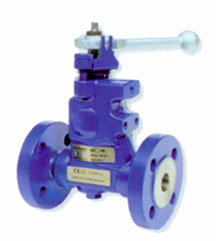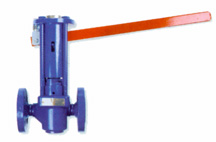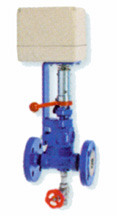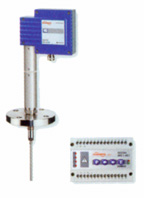 |
|
|
|
|
|
|
|
|
|
|
|
|
Blowdown
&
Control Valves
|
|
|
|
|
|
|
|
|
 |
|
|
|
|
|
|
|
|
 |
|
|
| BA
Series (Continuous Blowdown Valves) |
|
Model # |
Multistage trim
provides precise boiler blowdown controllability and extended
valve service life. Available in three ANSI classes for applications
up to 3,280 psig. Designed for extended service life with flashing
flow conditions and high pressure drops. Rotary 0-100 degree
manual scale provides optimum settings. Available with automation,
conductivity probe, and controller for precise TDS control. Two
year warranty. |
|
|
|
|
|
|
|
|
|
|
|
|
|
|
| PA
Series (Intermittent Blow Off Valves) |
|
Model
# |
| Large annular
orifice and rapid action provide effective sludge removal for blow-off
applications. Minimal treated water loss. Available in three ANSI
classes for applications up to 3,280 psig. ANSI B31.1 approved
with upstream block valve. Designed for high pressure drop applications.
Available with actuator and controller for timed actuation. Two
year warranty. |
|
|
|
|
|
|
|
|
 |
|
|
|
|
|
|
|
|
|
|
|
|
|
| Continuous
Blowdown Valve |
|
Model
# |
Valve with
adjustable stage nozzle, sample valve, and electric actuator
for automatically controlled continuous blowdown. automatically
controlled continuous blowdown to reduce blowdown wastage with
a GESTRA conductivity electrode and the continuous blowdown controller.
the blowdown line is automatically closed on shutdown of the
boiler plant.
Especially suited for boilers operating without constant supervision
(TRD 604). |
|
|
| Features
and Benefits |
|
|
- High blowdown capacity
- Automization of desalination
made easy
- Enables operation of boilers
with constant supervision
- Use in combination with
conductivity probe LRG
- Size DN 15 up to DN 40
- Pressure rating PN 40
up to PN 320
|
|
|
|
|
|
|
|
|
|
|
|
 |
|
|
|
|
|
|
|
|
 |
|
|
|
|
|
|
|
|
|
|
|
|
|
|
|
| Boiler
Safety - Conductivity Electrode Unit |
|
Model
# |
For
the highest boiler safety, GESTRA developed the self monitoring
low level alarm system. This system consists of a self monitoring
single electrode and a redundant, self checking low level switch.
this system is world wide proven and accepted.
The conductivity sensing electrode LRG 16-40 consists of a TDS
(Total Dissolved Solids) monitoring electrode for conductivity
measurement, a temperature sensor for detecting the fluid temperature
and a fully integrated conductivity (TDS) transmitter
The probe works together with the LRR 1-40 controller.
|
|
- LRG 16-40
Conductivity
Electrode
Unit
|
| Features
and Benefits |
|
|
- CANopen protocol
- Temperature compensated
conductivity (TDS)
- Self adjusting operation
- Reliable boiler water
control
- Reduced cabling and installation
|
|
|
|
|
|
|
|
|
|
|
|
|
|
|
|
|
| Boiler
Safety - Conductivity Control Unit |
|
Model
# |
The continuous
blowdown controller LRR 1-40 used in conjunction with the conductivity
sensing electrode LRG 16-40 constitutes a conductivity (TDS)
monitoring and control system. Electrical conductivity is used
to measure boiler water TDS (Total Dissolved Solids). |
|
- LRR 1-40
Conductivity
Control
Unit
|
| Features
and Benefits |
|
|
- Two conductivity limits with
one switch point each: TDS high (MAX) alarm and TDS low (MIN)
alarm
- Three position control
within a predefined proportional band
- TDS level (conductivity)
monitored and maintained within a predefined control range
- Stand-by input
- 24 H purging pulse for
continuous boiler blowdown
- CANBus system protocol
|
|
|
|
|
|
|
|
This
site is © Copyright Caribe Gasket 2009, All Rights Reserved |
|
|
|
|
 |
 |
 |
 |
 |
 |
 |
 |
 |
 |
 |
 |
 |
 |
 |
 |
 |





